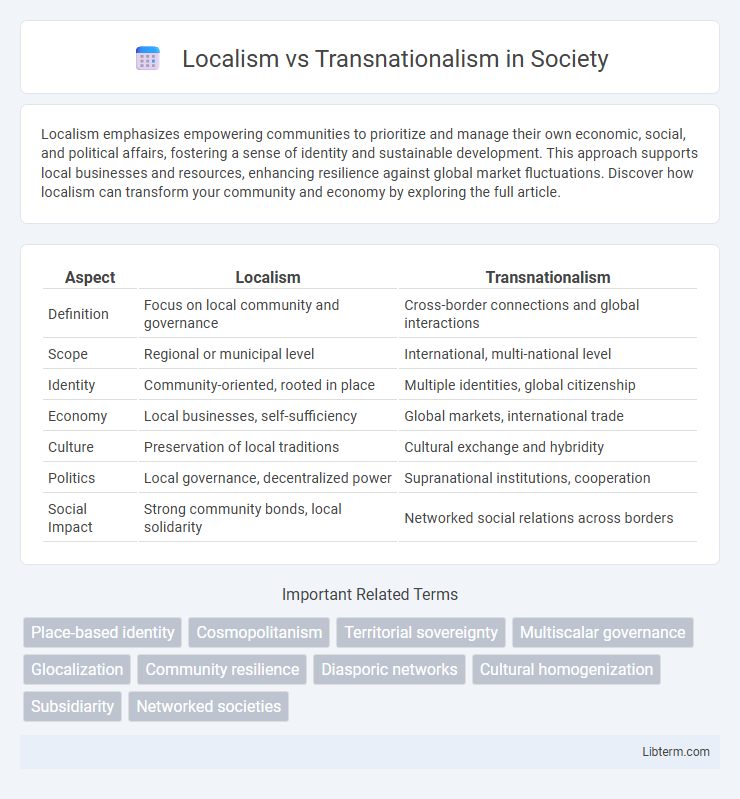Localism emphasizes empowering communities to prioritize and manage their own economic, social, and political affairs, fostering a sense of identity and sustainable development. This approach supports local businesses and resources, enhancing resilience against global market fluctuations. Discover how localism can transform your community and economy by exploring the full article.
Table of Comparison
| Aspect | Localism | Transnationalism |
|---|---|---|
| Definition | Focus on local community and governance | Cross-border connections and global interactions |
| Scope | Regional or municipal level | International, multi-national level |
| Identity | Community-oriented, rooted in place | Multiple identities, global citizenship |
| Economy | Local businesses, self-sufficiency | Global markets, international trade |
| Culture | Preservation of local traditions | Cultural exchange and hybridity |
| Politics | Local governance, decentralized power | Supranational institutions, cooperation |
| Social Impact | Strong community bonds, local solidarity | Networked social relations across borders |
Understanding Localism: Definition and Principles
Localism emphasizes empowering local communities by prioritizing regional governance, cultural identity, and economic self-sufficiency to foster sustainable development. It advocates for decentralization, advocating local decision-making autonomy to address unique social, ecological, and economic challenges effectively. Rooted in principles of community engagement and preservation of local traditions, localism challenges the dominance of global or transnational influences by reinforcing place-based resilience and social cohesion.
What is Transnationalism? Core Concepts Explained
Transnationalism refers to the process by which immigrants create and sustain multiple social relationships that link their societies of origin and settlement, enabling cross-border exchanges in economics, politics, and culture. Core concepts include social fields, where individuals maintain strong ties across nations; economic transnationalism, which involves cross-border business and remittances; and political transnationalism, characterized by dual citizenship and participation in political processes in multiple countries. This framework challenges traditional notions of fixed national identities by emphasizing fluid, multi-stranded connections that transcend geographic boundaries.
Historical Perspectives on Localism and Transnationalism
Historical perspectives on localism emphasize the importance of community-based identities and governance structures rooted in specific geographic regions, often resisting external influences and prioritizing cultural preservation. Transnationalism historically emerged through increased migration, trade, and communication networks, facilitating cross-border connections that transcend national boundaries and promote global interdependence. Key events such as the expansion of colonial empires, the rise of global capitalism, and the evolution of international institutions have shaped the dynamic interplay between localism and transnationalism throughout history.
Cultural Impacts: Preserving Identity vs Embracing Diversity
Localism emphasizes preserving cultural identity by maintaining traditional customs, languages, and practices unique to specific communities, fostering a strong sense of belonging and heritage. Transnationalism promotes embracing diversity through cross-border interactions, enabling cultural exchange and the blending of global influences that enrich societies. Balancing these approaches influences how cultures adapt, resist homogenization, and sustain meaningful collective identities in an interconnected world.
Economic Effects: Local Economies vs Global Markets
Localism fosters economic resilience by prioritizing small businesses and local supply chains, which strengthens community wealth and reduces dependency on volatile global markets. Transnationalism drives economic growth through expansive global trade networks and multinational corporations, increasing market access but often leading to income disparities and diminished local economic autonomy. Balancing these approaches impacts employment rates, resource distribution, and overall economic sustainability in both local and global contexts.
Political Dimensions: Sovereignty vs Global Governance
Localism emphasizes state sovereignty, prioritizing national self-determination and control over domestic affairs without external interference. Transnationalism advocates for global governance frameworks that transcend borders, promoting international cooperation to address issues like climate change and human rights. The political tension centers on balancing autonomous decision-making with the benefits of coordinated global policies.
Environmental Considerations: Local Initiatives vs Global Policies
Local initiatives in environmental protection prioritize community-specific resources and immediate ecological impacts, fostering tailored sustainable practices that reflect unique regional biodiversity and cultural values. Transnational environmental policies emphasize coordinated global actions to address climate change, pollution, and conservation on a broad scale, leveraging international agreements like the Paris Agreement to set unified targets and share technology. Effective environmental stewardship requires integrating local knowledge with transnational frameworks to ensure adaptive, scalable solutions that respond both to local ecosystem dynamics and global environmental challenges.
Technology’s Role in Shaping Local and Transnational Relationships
Technology accelerates the interplay between localism and transnationalism by enabling real-time communication and data exchange across geographic boundaries. Digital platforms and social media bolster local identities while simultaneously fostering transnational communities and global networks. Advanced technologies like blockchain and AI enhance cross-border collaborations, ensuring secure, transparent, and efficient interactions that reshape economic, cultural, and political relationships worldwide.
Case Studies: Successes and Challenges of Localism and Transnationalism
Localism fosters community empowerment and cultural preservation, as seen in the revitalization of indigenous markets in Oaxaca, Mexico, which boosted local economies and strengthened social cohesion. Transnationalism enables global networks and resource sharing, exemplified by the European Union's cross-border environmental initiatives that address climate change collaboratively but face challenges in policy harmonization and sovereignty concerns. Case studies highlight that localism's success depends on strong grassroots participation, while transnationalism's effectiveness hinges on balancing integration with respect for local identities.
The Future of Communities: Finding Balance Between Localism and Transnationalism
The future of communities hinges on balancing localism's emphasis on cultural identity and community governance with transnationalism's promotion of global connectivity and economic integration. Embracing digital technologies enables communities to foster local traditions while participating in transnational networks, enhancing social cohesion and economic opportunities. Sustainable development strategies must integrate local needs with global challenges to create resilient communities adaptable to cultural and environmental shifts.
Localism Infographic

 libterm.com
libterm.com